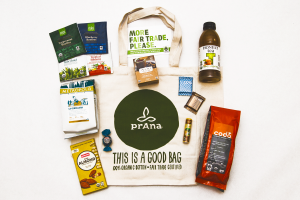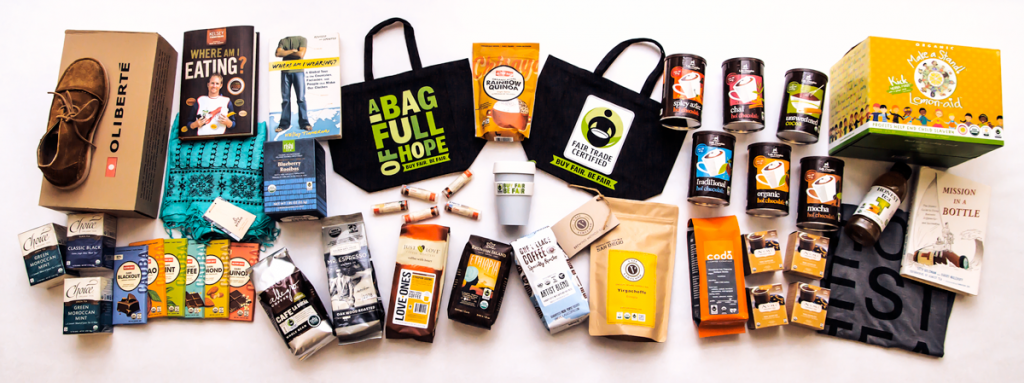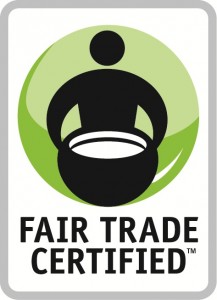#BeFair: Ending Fair Trade Month with a bang!
October is Fair Trade Month. I know it’s sort of late to be noting this, given that there is only one week of the month left. Better late than never, I guess.
I want Fair Trade month to go out with a bang and will be writing a series of #BeFair posts, starting with the one you are reading right now. If you leave a comment on any of these posts, you’ll be entered to win a shiny environmentally-friendly, socially-conscious gift bag. The winner will be randomly selected on Halloween and will win this…
This gift bag is awesome, but pales in comparison to the absolutely gi-freaking-normous grand prize that Fair Trade USA is giving away (both of my books included) for taking their Fairness survey at befair.org.
What does Fair Trade do?
- Establishes a minimum price guarantee for farmers to protect them against volatile global commodity markets.
- Sets environmental and social standards to protect people and planet.
- Pays farmers a social premium that farmers vote on how to spend. This could be on schools, roads, medical facility, or straight up dividing the money among all involved.
Fair Trade should be the way all trade is done
We live in a global economy that respects farmers less and less. Farmers are getting paid less and they are struggling to keep up with the changing climate. In Where Am I Eating I write about seeing Fair Trade in action, and how it’s one of the ways we can positively impact man and land.
Here’s an excerpt:
It’s amazing how often a discussion of food leads to a discussion of family. Annie and I used our family as an excuse to justify the way we’ve always eaten: we have two young kids and don’t have enough time so we need something quick. We need to save money so we can save for the kids’ college.
I’ve come to realize that we shouldn’t use our family as an excuse to justify eating poorly, but as a reason for eating healthier and more justly. How we eat impacts the futures of our children and the futures of farmers’ children around the world. That’s why we eat organic when possible. It’s good for us and it’s better for the farm workers. That’s why we’re trying to eat food that respects the land and people equally. I love my kids as much as Michael, a cocoa farmer who I met in Ivory Coast loves his, and because I know this, and because not eating chocolate is not an option, I need to find ways to support cocoa farmers like Michael with my purchases.
Fair Trade, in its various forms, is part of the answer.
“If we can get people to understand that something as simple as a banana or cup of coffee or a chocolate bar can change people’s lives,” Paul Rice, President of Fair Trade USA told me when I visited their headquarters in Oakland, “then we’re really onto something.”
After Paul told me that he rushed off to meet with some farmers. The office was filled with passionate employees who had traveled all over the earth, including Katie with whom I had traveled with in Colombia to meet the Arhuaco. The office buzzed with exciting ideas like allowing farm and factory workers to register complaints and rate their working environments through surveys on their cell phones. This would give workers a voice and allow brands that source from these farms and factories an on-the-ground look at the working conditions.
Fair trade shouldn’t need a special distinction from other types of trade, it should just be the way all trade happens: transparency of supply chains, environmental and social standards, and trading relationships in which all benefit. That’s all that Michael in the Ivory Coast, Felipe in Colombia, and Juan in Costa Rica are asking for. They don’t want any special treatment. They just want to work and support their families.
Ways to celebrate Fair Trade month
1) Buy something with this logo on it
2) Leave a comment on any of my BeFair posts for a chance to win a gift bag of goodies
3) Take the BeFair.org survey and be entered to win the gi-freaking-normous grandprize




Let your voice be heard!